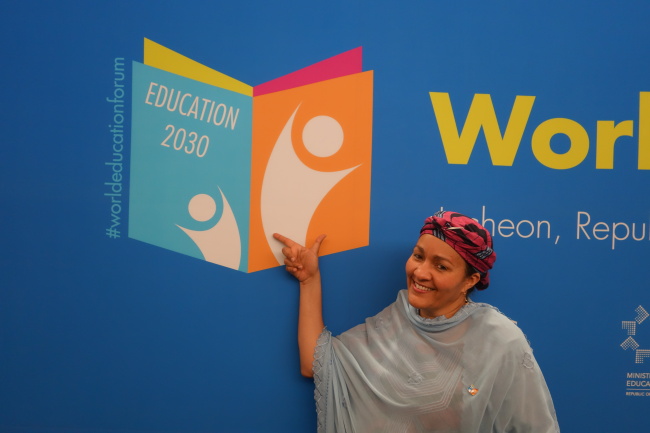[Herald Interview] ‘Education backbone of long-term development’
By Yoon Min-sikPublished : May 25, 2015 - 19:52
Often when countries strive for economic prosperity, investments in infrastructure, finance and technology spearhead their agenda.
While those sectors are important, Amina J. Mohammed, the special adviser to U.N. Secretary-General Ban Ki-moon on post-2015 development planning, said investing in education was equally, if not more, crucial.
“Education is the absolute backbone (of development). It’s fundamental to any society growing,” she told The Korea Herald.
Mohammed, formerly a coordinator of the gender and education task force for the U.N. millennium project, said fostering an educated population contributed to people’s capacity to handle incoming challenges.
“It enables changes and allows you to make choices,” she said.
While those sectors are important, Amina J. Mohammed, the special adviser to U.N. Secretary-General Ban Ki-moon on post-2015 development planning, said investing in education was equally, if not more, crucial.
“Education is the absolute backbone (of development). It’s fundamental to any society growing,” she told The Korea Herald.
Mohammed, formerly a coordinator of the gender and education task force for the U.N. millennium project, said fostering an educated population contributed to people’s capacity to handle incoming challenges.
“It enables changes and allows you to make choices,” she said.

The importance of education is particularly crucial for young democracies, Mohammed pointed out. She took the example of the Arab Spring, a revolutionary wave of protests in the Arab world that started in Tunisia.
“Young people can overthrow their government overnight, like in Tunisia. The real challenge is what you do the day after that,” she said. “That requires education. It requires an education to tell you that nothing is quickly fixed.”
She explained that after the conflict, it took long-term investment to rebuild infrastructure and to rebuild the minds of the people in society and the community. But if it is done right, the process can help resolve the conflict.
Education is the key to building one’s capacity to solve social problems internally, and not relying on outside forces to provide answers, she said.
“Human rights abuses across the world are unprecedented, you have to look at the root causes. The symptom is the conflict, but the root cause is lack of investment in basic education,” she said.
But the consequences of not having an education are disregarded because the effects are not immediately inconceivable, she said.
“I think this is what we’re missing; we’re not understanding the implications of not having proper education system to deliver quality education.
“If you don’t have a functioning health care system, people die. If you don’t have a functioning education system, it’s the living dead,” she said, emphasizing the role of an educated population as the driving force behind betterment of a society.
“Political leadership can’t do anything without an educated population. And the quality and the ambition of what you want to achieve has to be on the back of education.
As the U.N. seeks to set the post-2015 development agenda, it plans to build on the lessons they have learned from the millennium development goals, she said. One such difference is the strong institutions that will enforce the goals to be implemented.
Another is the universality of the agenda, making development about everyone and not just few people. In education, this translates into ensuring equal access to education for everyone.
Mohammed emphasized the importance of achieving gender equality in education. She pointed out that as women have different gifts than men, they can complement men in partnership.
“I think women in leadership positions are able to look and approach a solution from different places. There is less anxiety about having to approach a problem in a certain way, and they will look at different options,” she said. “Have more women in decision-making, and we’ll see lots of difference in issues such as climate change.”
By Yoon Min-sik (minsikyoon@heraldcorp.com)







![[Hello India] Hyundai Motor vows to boost 'clean mobility' in India](http://res.heraldm.com/phpwas/restmb_idxmake.php?idx=644&simg=/content/image/2024/04/25/20240425050672_0.jpg&u=)











